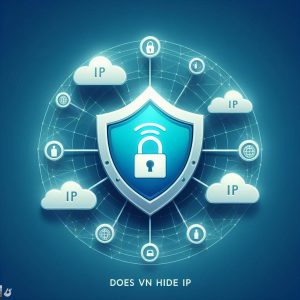Introduction
Your IP address is one of the most important pieces of identifying information exposed when browsing and communicating online. It reveals your location and links your activities across the internet. Virtual Private Networks (VPNs) have emerged as an essential tool for obscuring your IP address to enhance privacy. In this article, we’ll explore how VPNs conceal your IP, the benefits this provides, and limitations to be aware of.
IP Addresses and Online Privacy
An IP address is a unique series of numbers assigned to each computer or device connected to a network. Your home IP identifies your internet connection and can pinpoint your location down to the city or even street level.
When you access a website, your IP is automatically communicated to identify your device. This allows tracking your online behaviors, interests, sites visited, and apps used across the web over time by assembling profiles linked to your IP.
Obscuring your IP is critical for preserving privacy. Data firms, marketers, governments, and hackers can exploit exposed IPs to monitor activities or target individuals.

Introduction to Virtual Private Networks (VPNs)
A VPN creates a private, encrypted tunnel from your device to the internet that hides your IP address. VPN services replace your real public IP with one assigned from their servers – masking your identity. Traffic is encrypted as an additional shield.
Leading VPN providers like ExpressVPN, NordVPN, Surfshark, and CyberGhost make using this privacy tool simple. Most offer user-friendly apps for Windows, Mac, iOS, and Android. But how exactly do they conceal your IP?
How VPNs Work
VPNs hide your home IP using a combination of encryption and routing connections via remote servers:
Encrypting and Routing Internet Traffic
After installing and connecting to the VPN app, all your device’s network traffic is encrypted using protocols like OpenVPN or IKEv2/IPSec. This scrambles data to make it unreadable to outsiders.
The encrypted packets are then sent through a VPN tunnel to one of the provider’s servers in a different city or country you select. This new IP address masks your original one.
Device, VPN Server, and Internet Connections
From your device’s perspective, you are communicating directly with the VPN server. No other party can decipher or monitor your activity as it is encrypted.
The VPN server then accesses the internet on your behalf. Websites see the VPN IP instead of your home IP. When data is sent back, it travels through the tunnel to your device for decryption.
This two-way routing via an intermediary server hides your digital identity entirely while online. You can browse, communicate, and access sites privately without revealing your actual IP or location.

Benefits of Using a VPN
Using a VPN to conceal your IP provides several key privacy and security advantages:
Enhanced Security and Privacy
Encrypting traffic and masking your IP prevents hackers, spying agencies, and even Wi-Fi providers from monitoring your online activities or stealing data. Your home IP can be used to unleash targeted cyber attacks. A VPN hides it entirely.
With your IP hidden, your internet history cannot be logged or tied back to you. You remain anonymous while accessing sensitive information or confidential accounts. VPN IP masking is essential for secure public Wi-Fi usage.
Protection from Tracking and Surveillance
Marketers track you online via cookies linked to your IP to analyze your interests and serve targeted advertising. Governments and law enforcement may monitor activist groups. A VPN prevents correlating your browsing habits by concealing your IP address and encrypting traffic.
Using a VPN allows avoiding dragnet surveillance from data collection programs monitoring IP data flows. Your confidential information remains protected.
Access to Regionally Restricted Content
Governments and streaming platforms use IP detection to block access to certain sites or content based on location. A VPN enables bypassing this by assigning an IP from a different country to virtually re-route your region.
This allows accessing news, social media, and entertainment content restricted where you live. VPN IP masking means censors and geo-blocks cannot limit your browsing freedom.
How to Use a VPN
It’s easy to start hiding your IP with a VPN – just follow these steps:
Installing and Using a VPN on Devices
Most VPN providers offer dedicated apps for Windows, Mac, iOS, and Android to make setup effortless. Install the app on each device you want to run VPN protection on. Sign up for an account to configure your new virtual private identity.
Connect to a server location of your choice to mask your IP. Use the VPN app quick connect button or system tray icon to turn on protection when accessing public Wi-Fi or browsing sensitive content.
Importance of Selecting a Reliable VPN Provider
All quality VPNs will hide your IP, but some critical factors help identify the most private and secure providers:
- Strict no-logging policies – Avoid VPNs that store activity logs.
- Responsive 24/7 customer support – Help is there when you need it.
- Enterprise-grade encryption – Look for providers using AES-256 data encryption.
- Thousands of worldwide servers – More server options maximize performance and evasiveness.
- Unlimited bandwidth – Find VPNs with unlimited data use, speeds, and switching.
- Apps for all devices – Access VPN protection on the go across all your gadgets.
- Independent security audits – Verified no-logging claims and infrastructure quality.
Limitations of VPNs
While excellent for IP address concealment, understand VPNs have some limitations:
VPNs Do Not Provide Complete Anonymity
While VPNs hide your IP address, they cannot conceal all identifying information like cookies stored in your browser, device IDs, and other fingerprints. Using a VPN should be one part of a defense-in-depth privacy strategy.
Potential Performance Impacts
Routing your connection through a VPN can result in slower internet speeds and lag depending on the provider’s infrastructure capacity and your home bandwidth. This impact is usually minor for casual browsing.
Alternative Methods to Hide IP Addresses
Beyond VPNs, other options to obscure IP addresses include:
- The Tor network – Encrypts traffic and bounces through volunteer relays for deep anonymity. Slower speeds.
- Residential proxies – Route traffic through residential IP addresses. Cost can be high for many IPs.
- Public Wi-Fi – Use coffee shop or library networks instead of your home IP. Unsecure connections.
However, VPNs offer the best blend of security, performance, reliability and ease of use for most consumers.
Conclusion
Your IP address leaves you exposed every time you use the internet. Virtual Private Networks are an indispensable tool for masking your IP to take back control of your privacy and security. By understanding how VPNs conceal your identity, you can browse, communicate, and access content freely without fear of monitoring, censorship or targeting. Take time to find a top-rated VPN provider and make it a seamless part of a protecting your digital life.
